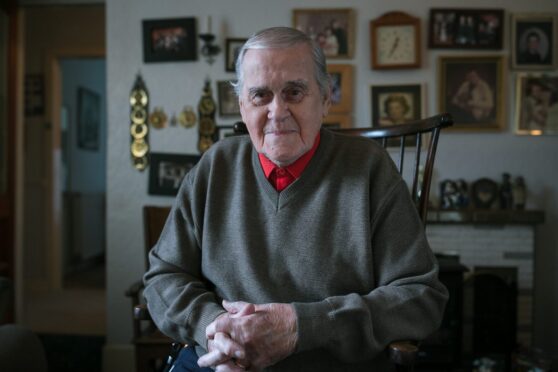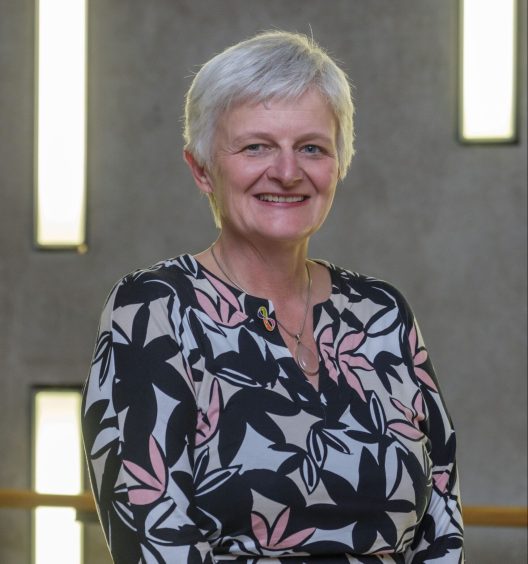
Loneliness and isolation has rocketed by 50% as a new survey reveals 150,000 older Scots will eat Christmas dinner alone this year.
Medical experts and campaigners warn the huge increase puts Scotland at risk of a major public health crisis.
Adam Stachura, policy director for Age Scotland said: “Our survey delivered devastating results. Such a huge increase was unexpected and shows we are at risk of a public health crisis if we do not take steps to halt the scourge of loneliness and isolation.”
Last year, The Sunday Post and Age Scotland launched the Big Braw Community campaign to end loneliness and cut the increased risk of dementia, heart disease and strokes.
Big Braw Community
Our very first ambassador, Glen Michael, whose Cartoon Cavalcade kept generations of families entertained, said the increase was “disappointing”.
But the 98-year-old said: “We can all still get behind the campaign and each do our own bit to stamp out loneliness. I hope everyone will reach out to someone they know is on their own. Knock on their door and say Happy Christmas! Share a card and some good wishes. Spread a little happiness and you will get happiness in return. We can all give a little time to think about others.
“If you are going to be on your own this Christmas, and you are still able to get out and about, do it with a smile and tell everyone you meet to have a lovely time. You will get smiles and happy wishes in return and that will make you feel better too.
“We all know someone living on their own who cannot get out, so reach out to them. People are just people. Bring them a jar of jam, or take them a cup of tea. It will be welcomed. I know it makes my day when that happens to me.”
After losing his beloved wife, Beryl, in 2015, Glen battled loneliness and knows only too well how long the days can be.
He said: “Loneliness is the worst thing in the world. It’s awful. Every minute seems like an hour when you are on your own. That is why I force myself to get out every day. I’ve learned how just speaking to others can boost my spirits. I’m lucky because I will be spending Christmas Day with my son, daughter and our family. I’ve been diagnosed with prostate cancer, but I’m not going to let even that get me down.
“My doctor has assured me there are marvellous treatments today, so I’m going to continue enjoying every single day and I refuse to worry about the cancer.
“I’m absolutely delighted Oor Big Braw Community has really taken off and I’m proud to be a part of it. It’s a wonderful campaign, and I hope everyone gets involved. We can all make a difference even in small ways.”
Dementia risk from isolation
Experts say our campaign has made a real difference by raising awareness. But more must be done by government to tackle the issue before health and social services are unable to cope with the demands caused by the 30% increased risk of dementia, heart and stroke cases caused by loneliness.
Dr Vivek Pattan, chairman of the old age faculty, Royal College of Psychiatrists in Scotland, said: “These are very sad statistics indeed. Feeling isolated and lonely can have a terrible effect on someone’s mental health. Loneliness can increase the risk of stress, anxiety and depression and doubles the risk of severe mental illness along with higher risks of heart disease, diabetes and stroke.
“Social isolation is recognised as a risk factor for dementia in many studies. This is why all politicians and decision makers should take the issue seriously.”
Age Scotland’s CEO, Katherine Crawford, said: “It’s devastating to think there is on average at least one older person on every street in Scotland who will be eating Christmas dinner alone, with television as their source of company.”
Party leaders are also urging action. Scottish Conservative leader Russell Findlay said: “I applaud The Sunday Post and Age Scotland for their fantastic Big Braw Community campaign. I would urge folk across Scotland to take a moment to think about reaching out to those who might appreciate some contact over the festive period.”
Minister Kaukab Stewart said: “We are taking action through our plan, A Connected Scotland. “Through our £3.8 million Social Isolation and Loneliness Fund we are investing in 53 community-based organisations across Scotland providing opportunities for people to connect and build stronger social connections. We welcome the support from The Sunday Post in helping to tackle the stigma associated with loneliness.”
Anyone feeling lonely this Christmas is urged to call Age Scotland on 0800 12 44 222 or age.scot/friendship
Simple ways to support your loved ones this Christmastime
Senior dementia care consultant David Wilson-Wynne from Stirling University’s healthy ageing team gives advice on how best to support a loved one, friend or neighbour with dementia at Christmas.
Over-stimulation
Consider the impact of loud music, changes to the environment (such as putting up decorations) and larger crowds of people. Adding additional stimulation, such as bright flashing lights, could be quite overstimulating.
How to fix it
This is a great opportunity to involve the person with dementia when decorating – give them choice, control and responsibility. They might not be able to do everything, but they could decide what they want and where. If you’re having music, keep it at a lower volume and ask what type of music the individual may want. Try and keep rooms clutter free and minimise busy groups of people.
Changes to routines
The majority of us have traditions, such as visiting loved ones, maybe a church visit. Often people feel that, if their loved one is in care, then they “feel better” being taken from that environment into another (family home, hotel or restaurant). This may be the case for some, but a change of routine might cause unnecessary stress for others.
Keep to routines
For people living with a dementia, we should ensure we keep to their routine as much as possible. Don’t over complicate things. It may make more sense to ask others to come into the person’s environment, not the other way around.
Dietary changes
Over filling plates, rich food and drink can have significant effects. We know taste buds change, resulting in the person living with dementia not always liking foods they may have enjoyed before, and they may also salt foods heavily to try and achieve taste.
Accommodate changes
Keep to familiar foods which will encourage eating. You could give the individual the choice and ability to control portion sizes (buffet style may help).
Emotional wellbeing
Christmas may evoke specific memories for loved ones, and it is important to be aware of emotions at this time. Music can be a memory trigger – both positive and negative. Within care environments it is also important to remember that not everyone has family or friends who are nearby, so it may generate feelings of isolation or loneliness.
How to support emotional wellbeing
Be generally aware of emotions, music and conversations that are happening. If you can, ask the individual what music they would like on, or if there’s anything they don’t want to hear.

Enjoy the convenience of having The Sunday Post delivered as a digital ePaper straight to your smartphone, tablet or computer.
Subscribe for only £5.49 a month and enjoy all the benefits of the printed paper as a digital replica.
Subscribe © MIKE WILKINSON
© MIKE WILKINSON © University of Stirling
© University of Stirling